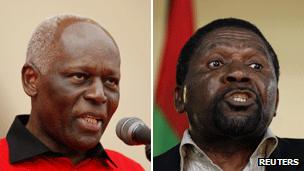Angola votes for parliament and president
- Published

Angolans have voted in the second national elections since the oil-rich country's 27-year civil war ended a decade ago.
Voting has been reported as smooth and orderly, despite fears of irregularities.
Former rebel group Unita, now the main opposition party, had called for a delay.
President Jose Eduardo dos Santos, 70, is expected to win another five-year term - he has been in power since 1979.
Angola has witnessed an economic boom since 2002, after the end of the civil war that had ravaged the country after independence from Portugal in 1975.
But the opposition says the wealth has only benefited a small elite.
The polls are the first held under a new constitution that abolished direct presidential elections. Instead, the head of the winning parliamentary list becomes president.
Reporter Louise Redvers in Luanda says small queues of people started to form an hour before polls opened. She says the voting seemed to have been taken place in an orderly fashion.
The BBC's Zenaida Machado in the western city of Benguela says the situation there is also calm and orderly, with only short queues of people waiting to vote.
But she says in one area, all registered voters had cast their ballots by mid-afternoon and so polling had closed.
She has also spoken to observers in the central city of Huambo, seen as an opposition stronghold, where voting has also been peaceful, with a relatively high turnout.
Hours before polls opened, it emerged that thousands of Angolans were unsure about where to vote, and many more could not find their name on voting lists.
The National Electoral Commission (NEC) denied there were problems.
Unita has expressed concern about a lack of transparency, especially the failure to publish a full electoral roll.
Unita spokesman Alcides Sakala has said the confusion vindicated his party's concerns, and called for the vote to be delayed.
"The NEC has done nothing to correct these problems," he said
Unequal growth
Analysts predict an easy victory for Mr dos Santos' Popular Movement for the Liberation of Angola (MPLA), which won more than 80% of the vote in the last legislative election four years ago.
The MPLA campaign stressed continuity and is being run under the slogan "Grow more, distribute better" - a response to criticism that the country's oil wealth remains concentrated in the hands of a small elite in what is now Africa's third largest economy.
In its campaign, Unita has been trying to benefit from growing discontentment with the MPLA, as well as the fact that despite strong growth, half the population remains in poverty and lack access to basic services such as water and electricity.
However, the party faces stiff competition from a new party, Casa, formed in March by former Unita politician Abel Chivukuvuku, who is targeting the youth vote and promoting an anti-corruption agenda.
On Thursday, Unita leader Isaias Samakuva unsuccessfully tried to meet Mr dos Santos to discuss his party's complaints.
Angelo Kapwacha, from the Civil Society Electoral Process Reflection, a group of non-politically aligned national observers, said the country was not ready for the vote.
"Some people do not know where they are supposed to be voting, others have been told to go to polling stations very far from their homes and there is a big confusion."
MPLA supporters have dismissed the claims of attempted fraud, saying their party does not need to cheat, and that the opposition allegations are merely a disguise for a lack of policies.
- Published27 August 2012
- Published29 August 2012
- Published4 April 2012
- Published27 May 2011
- Published3 July 2012
- Published2 February 2012
- Published1 September 2011
- Published21 February 2023